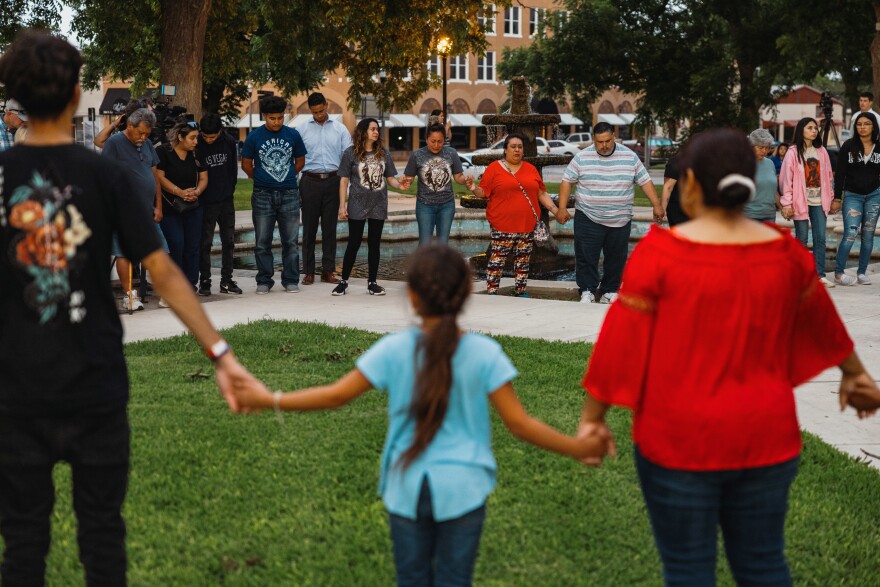Before the Golden State Warriors took to the court for a pivotal playoff game on Tuesday, Steve Kerr, the team's head coach and a vocal activist, stopped the pre-game interview to say that he didn't walk to talk about basketball. The news of the school shooting in Uvalde, Texas, had visibly pushed him to tears. And instead of talking about the game, Kerr wanted to talk about why the shootings were becoming all too common.
"There are 50 senators right now who refuse to vote on H.R. 8, which is a background check rule that the House passed a couple of years ago," Kerr said. "It's been sitting there for two years."
U.S. Sen. Chris Murphy, D-Conn., was on the Senate floor, echoing a similar sentiment on Tuesday. "Why are you here," he said to his colleagues, "if not to solve a problem as existential as this."
Tuesday's violence follows a familiar pattern of previous school shootings. After every one, there's been a tendency to ask, "How do we prevent the next one?"
For years, school safety experts, and even the U.S. Secret Service, have rallied around some very clear answers. Here's what they say.
It's not a good idea to arm teachers
There's broad consensus that arming teachers is not a good policy. That's according to Matthew Mayer, a professor at Rutgers Graduate School of Education. He's been studying school violence since before Columbine, and he's part of a group of researchers who have published several position papers about why school shootings happen.

Mayer says arming teachers is a bad idea "because it invites numerous disasters and problems, and the chances of it actually helping are so minuscule."
In 2018, a Gallup poll also found that most teachers do not want to carry guns in school, and overwhelmingly favor gun control measures over security steps meant to "harden" schools. When asked which specific measures would be "most effective" at preventing school shootings, 57% of teachers favored universal background checks, and the same number, 57%, also favored banning the sale of semiautomatic weapons such as the one used in the Parkland attack.
Raise age limits for gun ownership
School safety researchers support tightening age limits for gun ownership, from 18 to 21. They say 18 years old is too young to be able to buy a gun; the teenage brain is just too impulsive. And they point out that the school shooters in Parkland, Santa Fe, Newtown, Columbine and Uvalde were all under 21.
School safety researchers also support universal background checks and banning assault-style weapons. But it's not just about how shooters legally acquire firearms. A 2019 report from the Secret Service found that in half the school shootings they studied, the gun used was either readily accessible at home or not meaningfully secured.
Of course, schools don't have control over age limits and gun storage. But there's a lot they can still do.
Schools can support the social and emotional needs of students
A lot of the conversation around making schools safer has centered on hardening schools by adding police officers and metal detectors. But experts say schools should actually focus on softening to support the social and emotional needs of students.
"Our first preventative strategy should be to make sure kids are respected, that they feel connected and belong in schools," says Odis Johnson Jr., of Johns Hopkins University's Center for Safe and Healthy Schools.

That means building kids' skills around conflict resolution, stress management and empathy for their fellow classmates – skills that can help reduce all sorts of unwanted behaviors, including fighting and bullying.
In its report, the Secret Service found most of the school attackers they studied had been bullied. And while we are still learning about what happened in Uvalde, early reports suggest the shooter there was a regular target of bullying.
Jackie Nowicki has led multiple school safety investigations at the U.S. Government Accountability Office. She and her team have identified some of things schools can do to make their classrooms and hallways feel safer, including "anti-bullying training for staff and teachers, adult supervision, things like hall monitors, and mechanisms to anonymously report hostile behaviors."
The Secret Service recommends schools implement what they call a threat assessment model, where trained staff – including an administrator, a school counselor or psychologist, as well as a law enforcement representative – work together to identify and support students in crisis before they hurt others.
There's money to help schools pay for all this
One bit of good news: Because of pandemic federal aid, there's been a big jump in schools' willingness and ability to hire mental health support staff. According to the White House, with the help of federal COVID relief money, schools have seen a 65% increase in social workers, and a 17% increase in counselors.
NPR's Anya Kamenetz contributed to this story.
Copyright 2022 NPR. To see more, visit https://www.npr.org.




